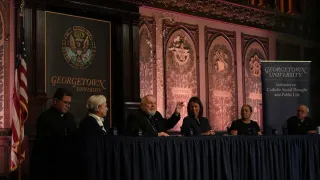August 13, 2018
Gay Days to Headline 'Drag Race' Star Detox
READ TIME: 2 MIN.
The 2018 Gay Days at Disneyland are set to take place Friday, October 5 to Sunday, October 7. For its 21st year, the event is expected to attract more than 30,000 LGBT park-hoppers from California and all over the country. They will enjoy Disneyland in a way that it can only be experienced during Gay Days.
Friday's highlights include WONDERLAND, a dance party with DJ Ray Rhodes (Tiger Heat, KBIG 104.), and featuring "RuPaul's Drag Race" favorite Detox. The event runs from 9:00 pm-1 am at Rumba Room Live at the Anaheim Garden Walk. Tickets are $25 and are available now.
Saturday, October 6 will be Gay Day at Disneyland, which includes a full day of activities in the park and culminates with KINGDOM, the weekend's signature dance party with music from renowned DJ Roland Blemares and special performance by multi platinum singer/songwriter Ingrid Michaelson ("The Way You Are", "Girls Chase Boys") KINGDOM will be held at its brand new location, Highway 39 in Anaheim 9 pm-1:30 am. Tickets are $50.
Saturday will also feature Steve Fales, bringing his acclaimed play "Confessions of a Mormon Boy" to Gay Days before its off-Broadway run this fall. Tickets are $35.
Sunday, October 7 will be Gay Day at Disney's California Adventure and the Gay Days Anaheim pool party, PLUNGE! from noon until 4:00 p.m. at the Anaheim Majestic Garden Hotel. DJ Zach Moos will be spinning while Mermaids splash around in the pool. Tickets are $25.
VIP ticket packages for the three parties are available now. VIP Gold tickets include access to an exclusive cocktail party with celebrity guests and an open bar.
For the first time, Gay Days Anaheim will offer a free film screening under the stars. On Friday, October 5, the Anaheim Majestic Garden Hotel will open its lawn to a cocktail mixer, followed by an outdoor screening of the Halloween perennial "Hocus Pocus," starring Bette Midler and Sarah Jessica Parker. The film will conclude just in time for fireworks viewing from the Anaheim Majestic's patio.
Both days in the parks will feature gatherings only available over Gay Days weekend, including a scavenger hunt, a group photo, a lesbian ice cream social, group meet ups at varying attractions, and many more events targeted to families, teens, bears, couples and Mouseketeers of every ilk. A complete schedule is available at the Gay Days website.
Other highlights of the weekend include free gift bags at the Gay Days Welcome Center (located inside the Trillium Room of Disney's Grand Californian Hotel), screenings of ABC pilots, and mixers.
Gay Days Anaheim is a "mix-in" with the park's other weekend guests, but gays and lesbians are encouraged to wear red shirts in order to identify each other and to show strong numbers. Official T-shirts are available at the official Gay Days at Disneyland website. (Note: Gay Days Anaheim is NOT a Disney-sponsored event, so Disney will not have any information regarding the "unofficial" happening.)
Sponsors for the event include Delta Airlines, Ketel One, Howard Johnson Anaheim, Adventures by Disney, and Aulani, Media sponsors are Here TV, The Fight, Queerty, Rage, Gay Desert Guide and EDGE.
For complete details, including discounted hotel rooms and park tickets, visit
www.GayDaysAnaheim.com.






